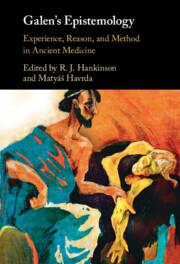Book contents
- Galen’s Epistemology
- Galen’s Epistemology
- Copyright page
- Contents
- Abbreviations
- Introduction
- Chapter 1 ‘Do I Wake or Sleep?’
- Chapter 2 Galen’s Empiricist Background
- Chapter 3 Discovery, Method, and Justification
- Chapter 4 From Problems to Demonstrations
- Chapter 5 Galen’s Notion of Dialectic
- Chapter 6 The Relationship between Perceptual Experience and Logos
- Chapter 7 Galen against Archigenes on the Pulse and What It Teaches Us about Galen’s Method of Diairesis
- Chapter 8 On Sense-Perception
- Chapter 9 Reason and Experience in Galen’s Moral Epistemology
- Chapter 10 The Arabic Alexandrians’ Summary of Galen’s On the Therapeutic Method
- Chapter 11 What Level of Certainty Can Medical Sign-Inference Reach?
- Bibliography
- Index of Passages
- General Subject Index
Chapter 5 - Galen’s Notion of Dialectic
Published online by Cambridge University Press: 04 May 2022
- Galen’s Epistemology
- Galen’s Epistemology
- Copyright page
- Contents
- Abbreviations
- Introduction
- Chapter 1 ‘Do I Wake or Sleep?’
- Chapter 2 Galen’s Empiricist Background
- Chapter 3 Discovery, Method, and Justification
- Chapter 4 From Problems to Demonstrations
- Chapter 5 Galen’s Notion of Dialectic
- Chapter 6 The Relationship between Perceptual Experience and Logos
- Chapter 7 Galen against Archigenes on the Pulse and What It Teaches Us about Galen’s Method of Diairesis
- Chapter 8 On Sense-Perception
- Chapter 9 Reason and Experience in Galen’s Moral Epistemology
- Chapter 10 The Arabic Alexandrians’ Summary of Galen’s On the Therapeutic Method
- Chapter 11 What Level of Certainty Can Medical Sign-Inference Reach?
- Bibliography
- Index of Passages
- General Subject Index
Summary
This chapter discusses a number of passages from Galen’s work that illustrate his idea of dialectic as a tool for scientific reasoning and discovery in particular. Through logical methods such as division the researcher identifies observable properties of the thing under examination (e.g. the heart, or brain) that indicate its hidden cause or essence, i.e. function (e.g. being the centre of a particular psychic faculty) in the context of theory formation. The medical practitioner for his part will profit from dialectical method when it comes to establishing a diagnosis. The notion of indication or sign is pivotal in that its bridges the stage of discovery and that of confirmation through demonstrative proof. In addition, ‘dialectical’ serves as a label for plausible assumptions and arguments in cases where truth is unattainable or at any rate has not yet been established through demonstrative proof. Various influences are involved in Galen’s version of dialectic: Plato’s Phaedrus and Timaeus, Academic epistemology, Aristotle’s works on scientific method as well as input from the medical schools, most notably Rationalist ideas (e.g. indication). His resulting position can best be described as an original synthesis developed with a view to the interests of the medical theorist and practitioner.
- Type
- Chapter
- Information
- Galen's EpistemologyExperience, Reason, and Method in Ancient Medicine, pp. 136 - 155Publisher: Cambridge University PressPrint publication year: 2022



